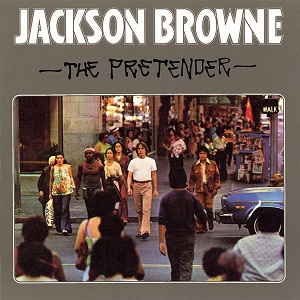
The Pretender is the fourth album by the American singer-songwriter Jackson Browne, released in 1976. It peaked at No. 5 on Billboard's album chart. The singles from the album were "Here Come Those Tears Again", which reached No. 23, and "The Pretender", which peaked at No. 58.
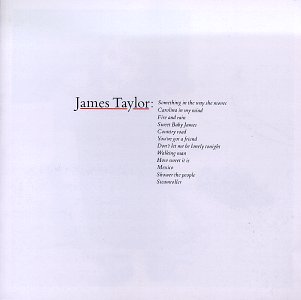
Greatest Hits is the first greatest hits album by American singer-songwriter James Taylor, released in November 1976 by Warner Bros. records. It remains Taylor's best-selling album, with over 11 million units being sold in the United States, making it among the best-selling albums of the 1970's.

One Man Dog is the fourth studio album by singer-songwriter James Taylor. Released on November 1, 1972, it features the hit "Don't Let Me Be Lonely Tonight", which peaked at number 14 on the Billboard charts on January 13, 1973. The follow-up single, "One Man Parade", also charted but less successfully, peaking at number 67 in the US and reaching number 55 on the Canadian Adult Contemporary chart. The basic tracks were primarily recorded in Taylor's home studio.

The Allnighter is the second solo studio album by Glenn Frey, the guitarist and co-lead vocalist for the Eagles. The album was released in mid-1984 on MCA in the United States and the United Kingdom, two years after Frey's modestly successful debut album No Fun Aloud and four years after the demise of the Eagles. It was and still is Frey's most successful solo album throughout his whole solo career, having reached No. 22 on the Billboard charts, and releasing two top 20 singles with "Smuggler's Blues" and "Sexy Girl". The album achieved gold status by the RIAA in the US. It is generally regarded as the culmination of the smoother, more adult-oriented sound of Frey's solo work.

Phoebe Snow is the debut album by American roots music singer-songwriter Phoebe Snow, released in 1974. It contains her Top 5 Billboard hit, "Poetry Man", and opens with her cover of Sam Cooke's R&B hit "Good Times".
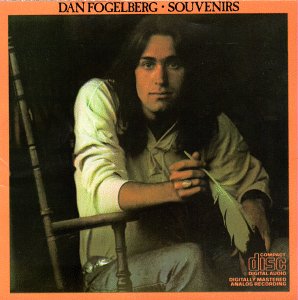
Souvenirs is the second studio solo album by the American rock singer-songwriter Dan Fogelberg. The album was released in late 1974, on the label Epic Records. The album reached No. 17 on the Billboard 200 in March 1975 and was certified double platinum by the RIAA. Joe Walsh produced the album and played on ten of the eleven tracks.
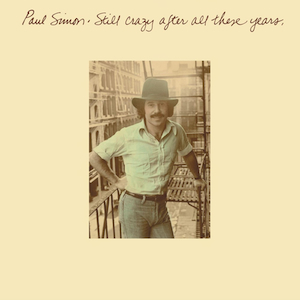
Still Crazy After All These Years is the fourth solo studio album by American singer-songwriter Paul Simon, released on October 17, 1975, by Columbia Records. Recorded and released in 1975, the album produced four U.S. Top 40 hits: "50 Ways to Leave Your Lover", "Gone at Last", "My Little Town", and the title track. It won two Grammy Awards for Album of the Year and Best Male Pop Vocal Performance in 1976.

No Secrets is the third studio album by American singer-songwriter Carly Simon, released by Elektra Records on November 28, 1972.

Hotcakes is the fourth studio album by American singer-songwriter Carly Simon, released by Elektra Records, on January 11, 1974. Featuring the major hits "Haven't Got Time for the Pain" and "Mockingbird", the latter a duet with her then-husband James Taylor, Hotcakes became one of Simon's biggest selling albums. Her first concept album, the autobiographical songs portray Simon happily married and beginning a family.

Boys in the Trees is the seventh studio album by American singer-songwriter Carly Simon, released by Elektra Records in April 1978.

Barry Manilow II is the second studio album by Barry Manilow released in 1974. Propelled by the major success of its lead single "Mandy" and featuring a further international hit in "It's a Miracle", the album was a commercial breakthrough for Manilow. First issued by Bell Records, it was reissued after the company was reorganized into Arista Records. The album's success spawned a notable parody in the picture sleeve of Ray Stevens' 1979 single, "I Need Your Help Barry Manilow".
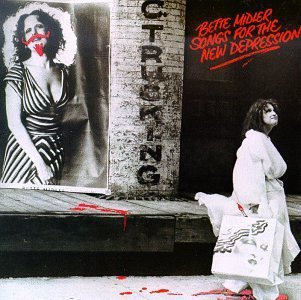
Songs for the New Depression is the third studio album by the American singer Bette Midler, released in early 1976 on the Atlantic Records label. The album was released on CD for the first time in 1990. A remastered version of the album was released by Atlantic Records/Warner Music in 1995. A limited edition remastered version of the album was released by Friday Music in 2014.

Thousand Roads is the third solo studio album by the rock artist David Crosby, a founding member of Crosby, Stills, Nash & Young. It was released on May, 4 1993 on Atlantic Records. It was the last solo studio album from Crosby until Croz in 2014.

Celebrate Me Home is the debut studio album by American singer-songwriter Kenny Loggins. It was released on April 13, 1977, by Columbia Records. The album was Loggins' first since Loggins and Messina ended in 1976, represents a slight move away from the folk-rock leanings of his previous recordings towards a more polished, soft rock sound.

Steve Winwood is the debut solo studio album by blue-eyed soulster Steve Winwood. It was released in 1977, three years after the break-up of his former band, Traffic. Though the album sold moderately well in the US, it was a commercial disappointment compared to Traffic's recent albums, peaking at number 22 on the Billboard albums chart. In the UK, where Traffic's recent albums had only been moderately successful, Steve Winwood reached number 12 on The Official Charts. Island Records released two singles from the album, "Hold On" and "Time Is Running Out", both of which failed to chart.

Never Letting Go is the fourth album by singer–songwriter Phoebe Snow, released in 1977.

Against the Grain is the fifth album by singer-songwriter Phoebe Snow, released in 1978.

Red Cab to Manhattan is the third album by singer/songwriter Stephen Bishop and his first for Warner Bros. Unlike his previous two albums, Careless and Bish, none of its tracks nor the album itself cracked the top 100 on the Billboard singles or albums charts. Like his previous albums, Bishop had some big names help on the album. Notable contributors include Eric Clapton, Phil Collins and Art Garfunkel.

Karla Bonoff is the RIAA Gold-certified first album by singer/songwriter Karla Bonoff. It includes several of Bonoff's compositions which had previously been prominently recorded: three by Linda Ronstadt and one by Bonnie Raitt ("Home").

Something Real is the seventh studio album by the American musician Phoebe Snow, released in 1989 by Elektra Records. It was her first album in eight years. While caring for her disabled daughter, Snow spent five years making demo tapes and mailing them to labels.




















